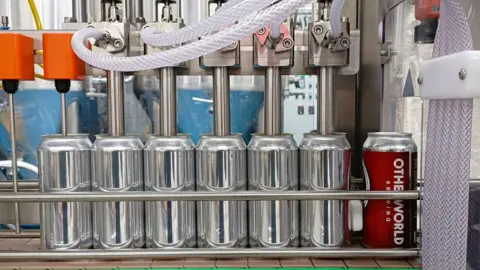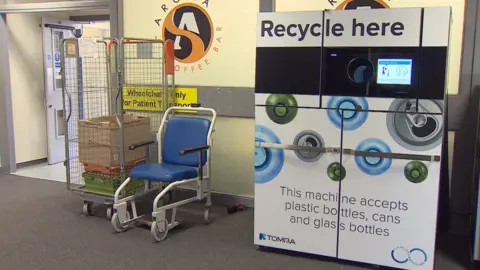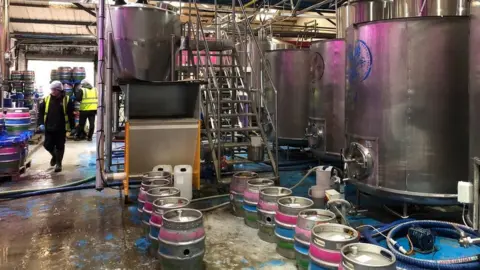Why has Scotland's deposit return scheme been delayed?
 OtherWorld
OtherWorldControversial plans to introduce a deposit return scheme for single-use drinks containers in Scotland have been delayed again.
The Deposit Return Scheme (DRS) was meant to go live this summer, then it was pushed back to March next year - and now MSPs have been told it won't be rolled out until at least October 2025.
The latest stumbling block has been a row between Holyrood and Westminster which wants glass excluded so that a consistent UK-wide approach can be taken. The Scottish minister championing the scheme says that amounts to "sabotage".
What is a deposit return scheme?
Deposit return schemes are used in many countries across the world to encourage people to recycle drinks containers such as bottles and cans.
Many older Scots will recall being able to get money back on their "ginger" (fizzy drink) bottles when they were children - and it works in a similar way.
Anyone who buys a drink in a certain types of container is charged a small deposit which is returned to them when they take the bottle or can to a recycling point.
The aim is to incentivise recycling, reduce litter and help tackle climate change by reducing the amount of material going to landfill.
How would it work in practice?

Under the Scottish government's proposals, a 20p deposit would be added to all single-use drinks containers made of PET plastic, metal or glass. It would apply to both alcoholic and soft drinks.
The consumer gets their money back by returning the container to retailers and hospitality premises that sell such single-use products to take away.
Some retailers will accept items being returned over the counter.
Larger stores, shopping centres and community hubs will operate automated receiving points known as reverse vending machines (RVMs). These will issue vouchers which can be used to pay for shopping.
Similar schemes are due to be introduced in England and Northern Ireland in 2025 for cans and plastic containers but only Wales and Scotland were planning to include glass.
Why is glass such a point of contention?
The glass industry is not keen on the deposit return model and would rather see glass recycled separately, for instance through kerbside collections.
It argues that more than 60% of glass is already recycled and that figure is set to improve further, even without a DRS which it says has many disadvantages.
It has been suggested the Scottish scheme could lead to an increase in crushed glass being used as aggregate for roads rather than melted down and reused.
That claim has been strongly denied by the firm set up to run the Scottish scheme, which says it has high targets for glass re-melting.
Concerns have also been raised by some businesses and UK ministers that having different schemes on either side of the border would harm cross border trade.
The Scottish government insists its proposed DRS would dramatically improve recycling rates for glass and reduce litter, and that including glass is vital for its success.
Who runs the scheme?
Drinks producers and importers are responsible for delivering the scheme. To help them, a private non-profit company called Circularity Scotland has been created to administer it on their behalf.
Producers are billed 20p by the administrator for every bottle or can they plan to put on the Scottish market - but they get this back by adding it to the cost of their products.
This 20p deposit is passed on down the chain, through wholesalers and retailers - and eventually on to the customer, who gets it back when the item is handed in for recycling.
In addition, producers are charged a small fee by the administrator to help cover the cost of running the service - about 2p per item for plastic or aluminium bottles. Glass bottles, if included, would incur a fee of about 4p per bottle.
Circularity Scotland will pay retailers a small handling fee for fulfilling their role as return points - roughly 2p or 3p per item, depending on the collection method.
The retailers pay customers for recycled items out of their own funds, but are reimbursed by the administrator.
The scheme is designed to be largely self-financing. The Scottish Environment Protection Agency (Sepa) will act as regulator, carrying out inspections to achieve compliance.
Why are some businesses worried?

Some firms have voiced concerns it will place extra costs and other burdens on them at a time when they are already struggling.
Small producers such as craft breweries said they were not against the idea in principle - but warned that the timetable and details of the scheme were problematic.
Producers are being encouraged to label items destined for sale in Scotland with a special Scottish barcode - and if they choose not do this, they face a surcharge of just over 1p per item.
Trade bodies say thousands of firms could end up being forced out of the Scottish market, and many products would disappear from the shelves.
Retailers can ask for an exemption from providing a collection service - but only if they can demonstrate a nearby collection point is willing to accept material on their behalf, or if collecting material would breach other rules such as fire safety or environmental health.
They are also worried they will have to pay higher prices to producers but there will be a delay in recouping that money from customers, hitting their cashflow.
Why has the scheme been delayed?
 PA Media
PA MediaA delay was announced by Humza Yousaf earlier this year, shortly after he became first minister, when he said he wanted to work with businesses to address their concerns.
The scheme had been due to launch this August, but it was put back to March 2024.
But then a new stumbling block came when it emerged that the UK government might not grant an exemption from the Internal Market Act which was needed for the scheme to proceed.
In February, lawyer Aidan O'Neill KC had suggested that the Scottish scheme could create an unlawful trade barrier with other parts of the UK, as it would result in different prices being charged either side of the border.
The UK government eventually decided it would grant an exemption but only if glass was taken out of the Scottish DRS plans to make it align with the scheme it was planning to introduce in England.
That position led to angry recriminations and eventually an announcement from Circular Economy Minister Lorna Slater of a further delay until at least October 2025.
